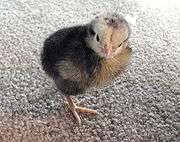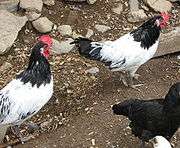Lakenvelder
|
A young Lakenvelder cock | |
| Conservation status | GEH, Germany: III, endangered |
|---|---|
| Other names | German: Lakenfelder |
| Country of origin | Germany |
| Use | eggs |
| Traits | |
| Weight | |
| Skin color | White |
| Egg color | White to tinted |
| Comb type | Single, 5-pointed[2] |
| Classification | |
| APA | Continental[3] |
| PCGB | Rare soft feather: light[4] |
| |
The Lakenvelder /ˈlɑːkənvɛldər/ or Lakenfelder is a breed of domestic chicken from the Nordrhein-Westfalen area of Germany and neighbouring areas of the Netherlands. It was first recorded in 1727.[5]
History
The Lakenvelder was first imported into Britain in 1901, and was shown in Shrewsbury in 1902.[5] It was admitted to the Standard of Perfection of the American Poultry Association in 1939.[3]
Characteristics
The head, neck hackle and tail of the Lakenvelder are solid black, without spots, ticks or stripes; the inner web of the wing primaries and secondaries is black. The rest of the bird is white with a pale blue-grey under-colour. The black-and-white pattern is similar to the colouring of the Lakenvelder breed of cattle, which originated in the same area.[5]
The eyes are bright chestnut or red, the beak dark horn, and the face, wattles and comb bright red, with white earlobes. The legs are slate-blue.[5]
Use
The Lakenvelder lays up to 160 white eggs, weighing up to 50 g each, per year.[1]
|
References
- 1 2 3 Rote Liste: Einheimische Nutztierrassen in Deutschland 2013 (in German). Bundesanstalt für Landwirtschaft und Ernährung. Accessed August 2014.
- ↑ Carol Ekarius (2007). Storey's Illustrated Guide to Poultry Breeds. North Adams, MA: Storey Publishing. ISBN 9781580176682. p. 57–58.
- 1 2 APA Recognized Breeds and Varieties As of January 1, 2012. American Poultry Association. Accessed August 2014.
- ↑ Breed Classification. Poultry Club of Great Britain. Accessed August 2014.
- 1 2 3 4 Victoria Roberts (2008). British poultry standards: complete specifications and judging points of all standardized breeds and varieties of poultry as compiled by the specialist breed clubs and recognised by the Poultry Club of Great Britain. Oxford: Blackwell. ISBN 9781405156424. p. 159–160.

